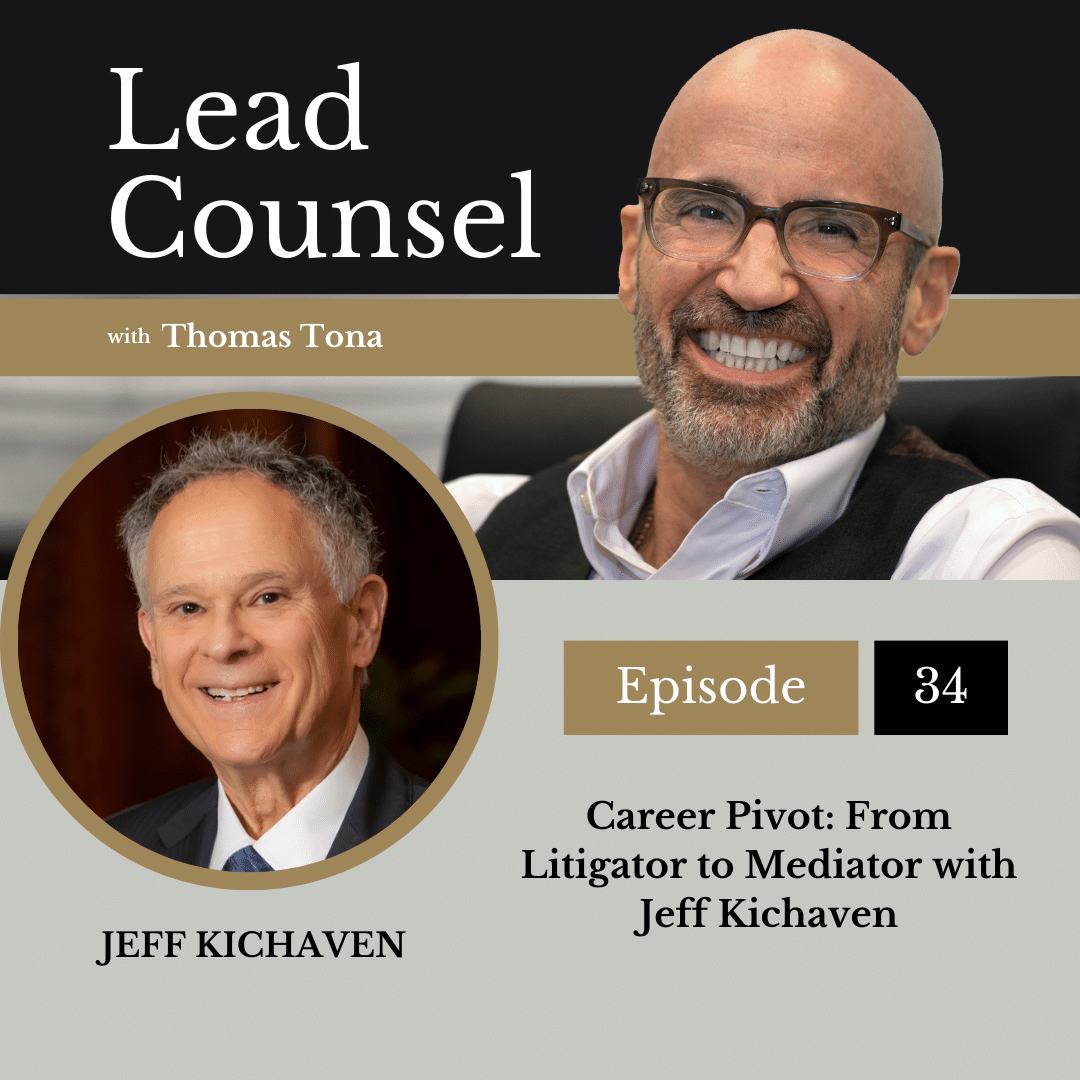We’re thrilled to have Jeff Kichaven, an acclaimed principal mediator with a wealth of knowledge and experience, guiding us through this journey into mediation. We discuss Jeff’s impressive career trajectory, tracing his footsteps from a commercial litigator all the way to becoming a full-fledged mediator. Jeff’s advice on transitioning from free to paid services is insightful for budding mediators.
We get into the integral role of mediation in conflict resolution. We toss around the benefits and drawbacks of voluntary and mandatory mediation with Jeff, who discusses the criticality of finding the right mediator. A major takeaway is that one should not solely rely on others’ opinions about a mediator’s style – as each case is unique. Jeff amplifies the importance of a mediator’s authenticity, personality, and ability to set the stage for clients and lawyers to do their jobs effectively.
Finally, we navigate the uncharted territories of sincerity, artificial intelligence in mediation, and negotiation. Jeff highlights the significance of ascertaining genuine commitment from all parties involved in the mediation process. Jeff also unfolds his unconventional approach to negotiation, challenging the age-old zero-sum game mentality. With Jeff’s unique perspective on negotiation and pearls of wisdom on expanding professional connections, this episode truly enriches the understanding of mediation and negotiation.
- In-depth exploration of the integral role of mediation in conflict resolution.
- The importance of authenticity, personality, and sincerity in a mediator and their role in creating a conducive environment for clients and lawyers.
- Exploration of the potential and limitations of artificial intelligence in mediation.
- A fresh perspective on negotiation, challenging the traditional zero-sum game mentality and discussing the potential for negotiation to raise professional standards.
- Practical advice for lawyers on selecting a mediator, emphasizing the need for direct communication and personal rapport over relying on others’ opinions.
- The responsibilities of a client, lawyer, and mediator during the mediation process.
We’d love for you to follow us if you haven’t yet. Click that purple ‘+’ in the top right corner of your Apple Podcasts app. We’d love it even more if you could drop a review or 5-star rating over on Apple Podcasts. Simply select “Ratings and Reviews” and “Write a Review” then a quick line with your favorite part of the episode. It only takes a second and it helps spread the word about the podcast.
Mediation is an intricate process that requires adept knowledge, extensive experience, and insightful strategy. It plays an integral role in conflict resolution and serves as a constructive alternative to litigation. In this article, we delve into the complex realm of professional mediation, exploring the journey from litigator to mediator, the importance of authenticity, the potential of artificial intelligence (AI) in mediation, and the transformation of negotiation strategies.
Professional mediation is an art that requires an understanding of human psychology, negotiation techniques, and the legal landscape. Renowned mediator Jeff Kichaven offers insights into the process and shares invaluable advice for budding mediators.
Transitioning from a litigator to a mediator requires meticulous planning and strategic execution. This journey involves gaining a wealth of knowledge through extensive training and continuous learning. Aspiring mediators often start by offering free mediation services to gain experience and build their reputation. This strategy not only provides an opportunity to practice skills but also helps establish credibility in the field. The critical turning point in this journey is when mediators transition from offering free services to charging for their expertise, thus turning their passion into a successful career.
Mediation serves as a catalyst in resolving disputes. Both voluntary and mandatory mediation have their advantages and drawbacks. It is essential to understand that finding the right mediator is a critical aspect of successful conflict resolution. The mediator’s authenticity, personality, and ability to facilitate constructive dialogue significantly impact the mediation process. It is advisable not to rely solely on others’ opinions about a mediator’s style, as each case is unique and requires a tailored approach.
In the realm of mediation, authenticity holds a significant place. Mediators need to stay true to their unique style and personality, as these traits can greatly influence the process and outcome of mediation. They should strive to create an environment where clients and lawyers can effectively perform their roles. Mediators must adapt to the unique circumstances of each case, but they should always remain true to their authentic selves.
The integration of AI in mediation is a relatively new concept. While AI has proven useful in many sectors, its utility in mediation is a topic of ongoing discussion. While AI can provide valuable tools and insights, it cannot replace the human touch necessary for effective mediation. The process of mediation requires genuine human interaction, empathy, and understanding that AI, in its current form, cannot provide.
Traditional negotiation often operates under a zero-sum game mentality. However, modern negotiation strategies are challenging this notion. An unconventional approach to negotiation is to view it not as a competition but as a collaborative process where both parties can achieve a mutually beneficial outcome. This approach encourages constructive dialogue, fosters understanding, and promotes better conflict resolution.
Professional mediation is a dynamic field that requires continuous learning, adaptability, and strategic planning. As we navigate this complex realm, we must remain open to new approaches and strategies. From understanding the importance of authenticity to harnessing the potential of AI and transforming negotiation strategies, every aspect contributes to the overall success of mediation. As we continue to explore and innovate, the field of mediation will undoubtedly continue to evolve, offering more effective solutions for conflict resolution.











